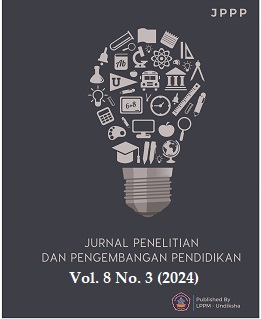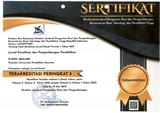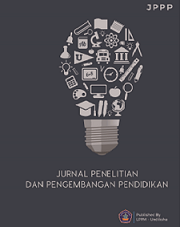Integration of Computational Thinking in GeoGebra-Assisted Measurement Learning on Mathematical Problem Solving Skills
DOI:
https://doi.org/10.23887/jppp.v8i3.78029Keywords:
Computational Thinking, Geogebra, Problem Solving, MathematicsAbstract
Solving math puzzles is one of the most essential skills students should have in the 21st century. Despite this, Indonesian students' problem-solving ability still needs to improve. This research aims to analyze the effect of integrating computational thinking in geogebra-assisted measurement learning on mathematical problem-solving skills. This research uses a quantitative approach with an experimental type. The sample for this research consisted of 45 elementary school students using simple random sampling techniques. The methods used to collect data are observation and tests. The instrument used to collect data is test questions. The techniques used to analyze data are quantitative analysis and inferential statistics. The results showed that there was variation in the ability of the experimental and control groups to solve mathematical puzzles. The t-test results show an average difference between the pretest and post-test results in the control and experimental classes. There is a significant difference in problem-solving abilities between students who take part in learning using the computational thinking approach assisted by Geogebra and students who take part in learning without the computational thinking approach assisted by Geogebra. It was concluded that learning using a computational thinking approach assisted by Geogebra can improve problem-solving abilities.
References
Anjarsari, E., Donny, D. F., & Abdul, W. A. (2020). Pengembangan Media Audiovisual Powtoon pada Pembelajaran Matematika untuk Siswa Sekolah Dasar. Jurnal Matematika dan Pendidikan Matematika, 2(2). https://doi.org/10.26594/jmpm.v5i2.2084. DOI: https://doi.org/10.26594/jmpm.v5i2.2084
Boom, K.-D., Bower, M., Siemon, J., & Arguel, A. (2022). Relationships between Computational Thinking and the Quality of Computer Programs. Education and Information Technologies, 27(6). https://doi.org/10.1007/s10639-022-10921-z. DOI: https://doi.org/10.1007/s10639-022-10921-z
Buchori, A., & Rahmawati, N. D. (2017). Pengembangan E-Modul Geometri Dengan Pendekatan Matematika Realistik Di Sekolah Dasar. Sekolah Dasar: Kajian Teori dan Praktik Pendidikan, 26(1), 23–29. https://doi.org/10.17977/um009v26i12017p023. DOI: https://doi.org/10.17977/um009v26i12017p023
Bulut, M., Akçakın, H. Ü., Kaya, G., & Akçakın, V. (2016). The effects of geogebra on third grade primary students’ academic achievement in fractions. International Electronic Journal of Mathematics Education, 11(2), 347–255. https://doi.org/10.29333/iejme/338. DOI: https://doi.org/10.29333/iejme/338
Chevalier, M., Giang, C., Piatti, A., & Mondada, F. (2020). Fostering computational thinking through educational robotics: A model for creative computational problem solving. International Journal of STEM Education, 7(1), 1–18. DOI: https://doi.org/10.1186/s40594-020-00238-z
Crismono, P. C. (2017). Penggunaan Media Dan Sumber Belajar Dari Alam Sekitar Dalam Pembelajaran Matematika. Gammath: Jurnal Ilmiah Prodi Pendidikan Matematika, 2(2), 72–77. https://doi.org/10.32528/gammath.v2i2.693.
Darmawan, A., Asa, B. N., Kurniawan, F., Nukhba, R., Albab, U., & Parno. (2020). Pengembangan Instrumen Tes Pemecahan Masalah bagi Mahasiswa Jurusan Fisika pada Materi Dinamika Partikel. Jurnal Pendidikan Fisika dan Keilmuan (JPFK), 6(1), 55–64. https://doi.org/10.25273/jpfk.v6i1.5579. DOI: https://doi.org/10.25273/jpfk.v6i1.5579
Febrian, F., Astuti, P., & Antika, R. (2019). Pelatihan Pengembangan Media Videoscribe dengan Konteks Lokal dalam Mengajarkan Objek Matematika bagi MGMPSMAKabupaten Bintan. J-ABDIPAMAS (Jurnal Pengabdian Kepada Masyarakat), 3(2), 101. https://doi.org/10.30734/j-abdipamas.v3i2.634. DOI: https://doi.org/10.30734/j-abdipamas.v3i2.634
Fitriani, W., Suwarjo, S., & Wangid, M. N. (2021). Berpikir Kritis dan Komputasi: Analisis Kebutuhan Media Pembelajaran di Sekolah Dasar. Jurnal Pendidikan Sains Indonesia, 9(2), 234–242. https://doi.org/10.24815/jpsi.v9i2.19040. DOI: https://doi.org/10.24815/jpsi.v9i2.19040
Fitriyah, C. Z., & Wardani, R. P. (2022). Paradigma Kurikulum Merdeka Bagi Guru Sekolah Dasar. Scholaria: Jurnal Pendidikan dan Kebudayaan, 12(3), 236–243. https://doi.org/10.24246/j.js.2022.v12.i3.p236-243. DOI: https://doi.org/10.24246/j.js.2022.v12.i3.p236-243
Fonda, A., & Sumargiyani, S. (2018). The Developing Math Electronic Module With Scientific Approach Using Kvisoft Flipbook Maker Pro For Xi Grade Of SeFonda, A., & Sumargiyani, S. (2018). The Developing Math Electronic Module With Scientific Approach Using Kvisoft Flipbook Maker Pro For Xi G. Infinity Journal, 7(2), 109–122. https://doi.org/10.22460/infinity.v7i2.p109-122. DOI: https://doi.org/10.22460/infinity.v7i2.p109-122
Giantara, F., & Astuti, A. (2020). Kemampuan Guru Matematika Mempertahankan Substansi Materi Melalui Proses Pembelajaran Online. Jurnal Cendekia : Jurnal Pendidikan Matematika, 4(2), 787–796. https://doi.org/10.31004/cendekia.v4i2.301. DOI: https://doi.org/10.31004/cendekia.v4i2.301
Hidayah, & Aulia. (2015). Penerapan Model Pembelajaran Missouri Mathematics Project (MMP) terhadap Kemampuan Pemecahan Masalah Siswa di SMP. EDU-MAT: Jurnal Pendidikan Matematika, 3(1), 49–58. https://doi.org/10.20527/edumat.v3i1.629. DOI: https://doi.org/10.20527/edumat.v3i1.629
Hidayah, I. N., & Fathimatuzzahra. (2019). Development of Math Comic Learning Media on the Subject of Algebraic Expressions for Seventh Grade of Junior High School Students. Journal of Physics: Conference Series, 1227(1). https://doi.org/10.1088/1742-6596/1227/1/012029. DOI: https://doi.org/10.1088/1742-6596/1227/1/012029
Hidayat, W., & Ayudia, D. B. (2019). Kecemasan Matematik dan Kemampuan Pemecahan Masalah Matematis Siswa SMA. Kalamatika: Jurnal Pendidikan Matematika, 4(2), 205–214. https://doi.org/10.22236/kalamatika.vol4no2.2019pp205-214. DOI: https://doi.org/10.22236/KALAMATIKA.vol4no2.2019pp205-214
Hidayatullah, Z., Wilujeng, I., Nurhasanah, N., Gusemanto, T. G., & Makhrus, M. (2021). Synthesis of the 21st Century Skills (4C) Based Physics Education Research In Indonesia. JIPF (Jurnal Ilmu Pendidikan Fisika), 6(1), 88. https://doi.org/10.26737/jipf.v6i1.1889. DOI: https://doi.org/10.26737/jipf.v6i1.1889
Indah Perawansa, F., Minarni, A., & Surya, E. (2019). Developing Learning Devices Based on GeoGebra Assisted Discovery Learning with SAVI Approach to Improve Motivation and Mathematical Communication of Senior High School Students MTs Aisyiyah. American Journal of Educational Research, 7(12), 893–900. https://doi.org/10.12691/education-7-12-1. DOI: https://doi.org/10.12691/education-7-12-1
Janah, S. R., Suyitno, H., & Rosyida, I. (2019). Pentingnya Literasi Matematika dan Berpikir Kritis Matematis dalam Menghadapi Abad ke-21. PRISMA, Prosiding Seminar Nasional Matematika, 2, 905–910.
Japa, N., Suarjana, I. M., & Widiana, W. (2017). Media Geogebra Dalam Pembelajaran Matematika. International Journal of Natural Science and Engineering, 1(2), 40–47. https://doi.org/10.23887/IJNSE.V1I2.12467. DOI: https://doi.org/10.23887/ijnse.v1i2.12467
Kert, S. B., Erkoç, M. F., & Yeni, S. (2020). The effect of robotics on six graders’ academic achievement, computational thinking skills and conceptual knowledge levels. Thinking Skills and Creativity, 38. https://doi.org/10.1016/j.tsc.2020.100714. DOI: https://doi.org/10.1016/j.tsc.2020.100714
Kjällander, S., Mannila, L., Åkerfeldt, A., & Heintz, F. (2021). Elementary students’ first approach to computational thinking and programming. Education Sciences, 11(2), 1–15. https://doi.org/10.3390/educsci11020080. DOI: https://doi.org/10.3390/educsci11020080
Lestari, W. D., Yuhanna, W. L., & Lukitasari, M. (2020). Pengembangan Media Bio Pop-Up Book Terintegrasi Science, Environment, Technology, And Society (SETS) Pada Pembelajaran Biologi Materi Daur Biogeokimia. Jurnal Edukasi Matematika dan Sains, 8(2), 130–139. https://doi.org/10.25273/jems.v8i2.7442. DOI: https://doi.org/10.25273/jems.v8i2.7442
Maharani, S., Nusantara, T., As’ari, A. R., & Qohar, A. (2020). Computational Thinking : Media Pembelajaran CSK (CT-Sheet for Kids) dalam Matematika PAUD. Jurnal Obsesi : Jurnal Pendidikan Anak Usia Dini, 5(1), 975–984. https://doi.org/10.31004/obsesi.v5i1.769. DOI: https://doi.org/10.31004/obsesi.v5i1.769
Malikah, S., Winarti, W., Ayuningsih, F., Nugroho, M. R., Sumardi, S., & Murtiyasa, B. (2022). Manajemen Pembelajaran Matematika pada Kurikulum Merdeka. Edukatif : Jurnal Ilmu Pendidikan, 4(4), 5912–5918. https://doi.org/10.31004/edukatif.v4i4.3549. DOI: https://doi.org/10.31004/edukatif.v4i4.3549
Mirnawati, M., & Basri, M. (2020). Pengaruh Kecerdasan Emosional Terhadap Hasil Belajar Matematika Siswa Sekolah Dasar. Jurnal Riset Pendidikan Dasar, 03(2), 207–213. https://doi.org/10.26618/jrpd.v1i1.1240. DOI: https://doi.org/10.26618/jrpd.v1i1.1240
Nendasariruna, T., MAsjudin, & Abidin, Z. (2018). Pengembangan komik matematika berbasis kontekstual pada materi persegi panjang bagi siswa kelas vii. Jurnal Media Pendidikan Matematika, 4(2), 76–79. https://doi.org/10.33394/mpm.v4i2.374.
Nurdin, E., Ma’aruf, A., Amir, Z., Risnawati, R., Noviarni, N., & Azmi, M. P. (2019). Pemanfaatan video pembelajaran berbasis Geogebra untuk meningkatkan kemampuan pemahaman konsep matematis siswa SMK. Jurnal Riset Pendidikan Matematika, 6(1), 87–98. https://doi.org/10.21831/jrpm.v6i1.18421. DOI: https://doi.org/10.21831/jrpm.v6i1.18421
Primadewi, A., & Agustika, S. (2022). Video Animasi Berorientasi Problem-Based Learning untuk Meningkatkan Motivasi Belajar Matematika Siswa Kelas IV SD. Jurnal Edutech Undiksha, 10(1), 167–177. https://doi.org//10.23887/jeu.v10i1.46477.
Rahmata, A., Tuljannah, LaiRahmata, A., Tuljannah, L., Chotimah, S. C., & Fiangga, S. (2020). Validitas E-Comic Matematika Berbasis Pemecahan Masalah pada Materi Kesebangunan. Jurnal Review Pembelajaran Matematika, 5(1), 53–65. https://doi.org/10.15642/jrpm.2020.5.1.53-65. DOI: https://doi.org/10.15642/jrpm.2020.5.1.53-65
Rich, K. M., Yadav, A., & Larimore, R. A. (2020). Teacher implementation profiles for integrating computational thinking into elementary mathematics and science instruction computational thinking into elementary mathematics. Education and Information Technologies, 1(July). https://doi.org/10.1007/s10639-020-10115-5. DOI: https://doi.org/10.1007/s10639-020-10115-5
Rohmawati, E., & Kristanto, V. H. (2018). Pengembangan Media Pembelajaran Menggunakan Geogebra Pada Sub Pokok Bahasan Garis Singgung Persekutuan Dua Lingkaran. PYTHAGORAS: Jurnal Program Studi Pendidikan Matematika, 7(1), 78–88. https://doi.org/10.33373/pythagoras.v7i1.1186. DOI: https://doi.org/10.33373/pythagoras.v7i1.1186
Sao, S., Mei, A., Ningsih, N., Mei, M. F., Wondo, M. T. S., Seto, S. B., Naja, F. Y., Meke, K. D. P., & Manda, G. S. (2021). Bimbingan belajar di rumah menggunakan alat peraga blok pecahan pada masa pandemi covid 19. Mitra Mahajana: Jurnal Pengabdian Masyarakat, 2(2), 193–201. https://doi.org/10.37478/mahajana.v2i2.1031. DOI: https://doi.org/10.37478/mahajana.v2i2.1031
Septikasari, R., & Frasandy, R. N. (2018). Keterampilan 4C Abad 21 dalam Pembelajaran Pendidikan Dasar. Tarbiyah Al-Awlad. https://doi.org/10.15548/alawlad.v8i2.1597.
Soboleva, E. V, Sabirova, E. G., Babieva, N. S., Sergeeva, M. G., & Torkunova, J. V. (2021). Formation of Computational Thinking Skills Using Computer Games in Teaching Mathematics. Eurasia Journal of Mathematics, Science and Technology Education, 17(10). https://doi.org/10.29333/ejmste/11177. DOI: https://doi.org/10.29333/ejmste/11177
Sugiyono. (2015). Metode penelitian pendidikan pendekatan kuantitatif, Kualitatif dan R&D. Alfabeta.
Tseng, T. H., Tai, Y., Tsai, S. P., & Ting, Y. L. (2018). Students’ self-authoring mobile App for integrative learning of STEM. International Journal of Electrical Engineering Education, 1–12. https://doi.org/10.1177/0020720918800438. DOI: https://doi.org/10.1177/0020720918800438
Ulhusna, M., Putri, S., & Zakirman. (2020). Permainan Ludo untuk Meningkatkan Keterampilan KolaborasiSiswa dalam Pembelajaran Matematika. International Journal of Elementary Education, 4(2). https://doi.org/10.23887/ijee.v4i2.23050. DOI: https://doi.org/10.23887/ijee.v4i2.23050
Utami, R. W., & Wutsqa, D. U. (2017). Analisis kemampuan pemecahan masalah matematika dan self-efficacy siswa SMP negeri di Kabupaten Ciamis. Jurnal Riset Pendidikan Matematika, 4(2), 166. https://doi.org/10.21831/jrpm.v4i2.14897. DOI: https://doi.org/10.21831/jrpm.v4i2.14897
Utari, D. R., Wardana, M. Y. S., & Damayani, A. T. (2019). Analisis Kesulitan Belajar Matematika dalam Menyelesaikan Soal Cerita. Jurnal Ilmiah Sekolah Dasar, 3(4). https://doi.org/10.23887/jisd.v3i4.22311. DOI: https://doi.org/10.23887/jisd.v3i4.22311
Wang, X. C., Choi, Y., Benson, K., Eggleston, C., & Weber, D. (2021). Teacher’s Role in Fostering Preschoolers’ Computational Thinking: An Exploratory Case Study. Early Education and Development, 32(1), 26–48. https://doi.org/10.1080/10409289.2020.1759012. DOI: https://doi.org/10.1080/10409289.2020.1759012
Widiantari, N. K. K., Suparta, I. N., & Sariyasa, S. (2022). Meningkatkan literasi numerasi dan pendidikan karakter dengan e-modul bermuatan etnomatematika di era pandemi COVID-19. JIPM (Jurnal Ilmiah Pendidikan Matematika), 10(2), 331–343. https://doi.org/10.25273/jipm.v10i2.10218. DOI: https://doi.org/10.25273/jipm.v10i2.10218
Winata, R., & Friantini, R. N. (2018). Proses Pemecahan Masalah Mahasiswa Pendidikan Matematika STKIP Pamane Talino. FIBONACCI: Jurnal Pendidikan Matematika dan Matematika, 4(1), 87–96. https://doi.org/10.24853/fbc.4.1.87-96. DOI: https://doi.org/10.24853/fbc.4.1.87-96
Wiryanto. (2020). Proses Pembelajaran Matematika Di Sekolah Dasar Di Tengah Pandemi Covid-19. Jurnal Review Pendidikan Dasar: Jurnal Kajian Pendidikan dan Hasil Penelitian, 6(2), 125–132. https://doi.org/10.26740/jrpd.v6n2.p125-132. DOI: https://doi.org/10.26740/jrpd.v6n2.p125-132
Wulandari, N. P. R., Dantes, N., & Antara, P. A. (2020). Pendekatan Pendidikan Matematika Realistik Berbasis Open Ended Terhadap Kemampuan Pemecahan Masalah Matematika Siswa. Jurnal Ilmiah Sekolah Dasar, 4(2), 131. https://doi.org/10.23887/jisd.v4i2.25103. DOI: https://doi.org/10.23887/jisd.v4i2.25103
Yağcı, M. (2019). A valid and reliable tool for examining computational thinking skills. Education and Information Technologies, 24(1), 929–951. https://doi.org/10.1007/s10639-018-9801-8. DOI: https://doi.org/10.1007/s10639-018-9801-8
Zetriuslita, Nofriyandi, & Istikomah, E. (2020). The Increasing Self-Efficacy and Self-Regulated through GeoGebra Based Teaching reviewed from Initial Mathematical Ability (IMA) Level. International Journal of Instruction, 14(1), 587–598. https://doi.org/10.29333/IJI.2021.14135A. DOI: https://doi.org/10.29333/iji.2021.14135a
Downloads
Published
How to Cite
Issue
Section
License
Copyright (c) 2024 Kuni Kumala Izza, Noening Andrijati

This work is licensed under a Creative Commons Attribution-ShareAlike 4.0 International License.
Authors who publish with the Jurnal Penelitian dan Pengembangan Pendidikan agree to the following terms:
- Authors retain copyright and grant the journal the right of first publication with the work simultaneously licensed under a Creative Commons Attribution License (CC BY-SA 4.0) that allows others to share the work with an acknowledgment of the work's authorship and initial publication in this journal.
- Authors are able to enter into separate, additional contractual arrangements for the non-exclusive distribution of the journal's published version of the work (e.g., post it to an institutional repository or publish it in a book), with an acknowledgment of its initial publication in this journal.
- Authors are permitted and encouraged to post their work online (e.g., in institutional repositories or on their website) prior to and during the submission process, as it can lead to productive exchanges, as well as earlier and greater citation of published work. (See The Effect of Open Access)








